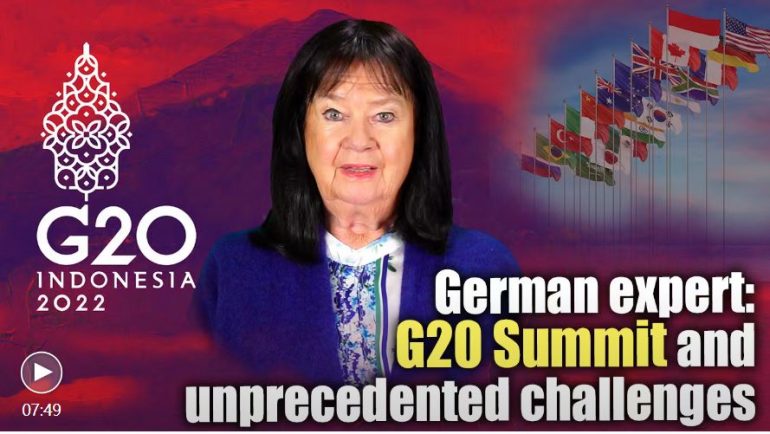om G20-topmødet og hidtil usete udfordringer

Kommer senere på dansk:
Nov. 14, 2022 (EIRNS)—An eight-minute video special by Helga Zepp-LaRouche, with a headline “German Expert: G20 Summit and Unprecedented Challenges” was broadcast today by CGTN with the following description:
“With a purpose of collective action and inclusive collaboration among major developed countries and emerging economies around the world, the 17th G20 Summit will take place from 15-16 November 2022 in Bali. What are the unprecedented challenges that world leaders will find answers for at this year’s assembly? Join Helga Zepp-LaRouche, founder and president of the Schiller Institute, to explore more!”
Se videoen her.
In the video (see below for the full text), Zepp-LaRouche asserts that the G20 summit occurs at a moment of unprecedented challenges to mankind—the proxy war in Ukraine, which could escalate to nuclear war; inflation which originates with QE decisions pumping trillions of dollars into the survival of an ailing system since 2008, now causing massive protests against inflation in Europe; the energy crisis, which has to do with Germany’s exit from nuclear and fossils energy sources as well as the impact of anti-Russian sanctions on gas supplies delivered to Europe and other parts of the world; the three years of pandemic; the threat that 1.7 billion humans will not have an adequate food supply and 2 billion have no access to clean water.
All these challenges threaten mankind as a whole, Zepp-LaRouche state. Therefore the question is whether the leaders who attend the G20, as the most important international forum for discussion of cooperation, will act constructively. Ten leaders of the G20 are from the West, the other ten are from the East and the Global South. Will the Bali Summit follow leaders with constructive proposals for a shared future of mankind like Xi Jinping today, or historic leaders, like President Sukarno at the Bandung Non-Aligned Movement summit in 1955 or José López Portillo’s UN General Assembly address in 1982; or will they follow the destructive course of the Western geopoliticians?
What the world needs is a new security and development architecture that takes into account the interests of every nation to stop war; a new and just economic order to solve the world financial crisis; a doubling of food production to end starvation; and to build a modern health system in every country to forestall the threat of pandemics, Zepp-LaRouche concluded.
Her er afskriftet på engelsk:
{{Helga Zepp-LaRouche:}} This year, when the G20 meets in Bali, Indonesia, on November 15th and 16th, the world faces unprecedented challenges in human history. As President Xi Jinping recently emphasized, he called on all countries to uphold the common values of humanity, peace development, fairness, justice, democracy, and freedom, further mutual understanding, and form close bonds with other people. And he said, let us concentrate all our forces to face all kinds of global challenges.
The gremium [consultative body] which should be best suited to address and find solutions for those challenges is, or should be, the G20, the group of leading industrial and emerging countries, which since September 2009, are the central forum for international economic cooperation. This was decided at the G20 summit in Pittsburgh, by the heads of government in response to the financial crisis of 2008.
This year, the G20 will meet in Bali, Indonesia, on November 15th and 16th, also in memory of the history Bandung Conference.
What are these “unprecedented challenges” these leaders should address and find answers for? To name only the most urgent ones:
First, the military conflict over Ukraine, which is not a war between Russia and Ukraine, but a proxy war between NATO and Russia, which has the potential to get out of control, and in the worsecase, escalate into a global thermonuclear war.
Second, we see an explosion of inflation rates, for which the war in Ukraine is only one aspect. The sanctions against Russia have completely backfired: The economies of Europe and Germany are hit by a tremendous blowback. The prices of food are skyrocketing, energy prices are becoming unpayable, many energy-intensive firms are going bankrupt, such as bakeries; restaurants are giving up. More and more desperate people are taking to the streets, in France, in Belgium, in Holland. The farmers are radicalizing. In Italy, tens of thousands are demonstrating against the war danger.
In many German cities, people demonstrate to stop the sanctions, to reduce prices. More fundamentally, the policies of money printing by the central banks, the policy of so-called “quantitative easing” (QE), whereby they have pumped trillions of dollars and euros into the financial system, has created this inflation. One can see the clear correlation between the QE and prices going up.
Third, for the energy price crisis, there are different factors. Germany’s exit from nuclear energy, for which no adequate replacement has been organized. Now, the exit is also from fossil fuels. Then, there has been a lack of investments in energy flux dense energy types. And even in France, which has a strong nuclear energy sector, they were pushed to put money into renewables, neglecting the maintenance of nuclear plants. Then, the sanctions against Russia as the main source for deliveries to Europe, which resulted in a new dependence on U.S. LNG, which makes energy much more expensive, and naturally, a price explosion as a result of the sabotage of the Nord Stream pipelines.
Fourth, then there is world food crisis. According to figures from the World Food Programme, 1.7 billion people are threatened with famine, {2 billion people have no clean water, which has a life-shortening effect, because diseases can spread easily.}
There is the COVID-19 pandemic and threat of other pandemics looming. After almost three years of the pandemic, if one compares the statistics of death by continent or country, one can see a correlation between the different responses by the governments and the death rates, and the lack of modern health systems in the majority of countries around the world.
So, our civilization indeed faces an unprecedented combination of challenges, of which the first one, the war danger, could threaten the very existence of mankind. But, also the other dangers, hyperinflation, energy shortage, world famine and pandemics, are such then one should assume that the governments would feel the urgent obligation to work together to solve them.
But will they?
As of now, ten participating countries belong to the camp of the West: Germany, France, Great Britain, Italy, United States, Japan, Canada, Australia, South Korea, and the EU.
Another ten countries are those who are working with the countries of the Global South, who are really the most affected by all the calamities mentioned above: China, Brazil, Argentina, India, Russia, Indonesia, Türkiye, South Africa, Mexico, and Saudi Arabia.
So, the big question for the billions of people in the Global South is, can these leaders stop their geopolitical confrontations for the sake of the shared community of the future of mankind?
Look at what great leaders said at previous similar forums:
“It is a new departure in the history of the world that leaders of the Asian and African peoples can meet together in their own countries, to discuss and deliberate upon matters of common concern.” [Indonesian President Sukarno, Bandung, April 18, 1955]
How will the speeches of the leaders at the G20 summit measure up to what other great leaders said at other, less-challenging occasions? Such as the famous address by [Mexican] President López Portillo at the United Nations General Assembly in 1982: “We cannot fail. There is good reason to be alarmist. Not only the heritage of our civilization is at stake, but also the very survival of our children, of future generations, and of the human species.” [Mexican President José López Portillo, October 11, 1982; https://larouchepub.com/eiw/public/1982/eirv09n39-19821012/eirv09n39-19821012.pdf]
The fate of maybe billions of people will depend on what these leaders will do. Hopefully, all of them, or at least a powerful group of nations will agree on a joint program which will solve the existential challenges of humanity:
To stop the war, a new global security and development architecture, which takes into account the interests of every country on the planet.
To solve the financial crisis, agree on a new world economic order and a new credit system.
To stop the energy crisis, end the sanctions and cooperate on energy security.
To stop the world famine, double food production worldwide.
To stop the spread of pandemics, build a world health system, a modern health system in every single country in the world.
Let’s hope that this moment of unprecedented challenges has founder leaders that have the greatness to save humanity!







